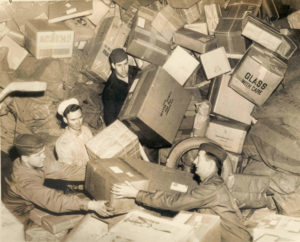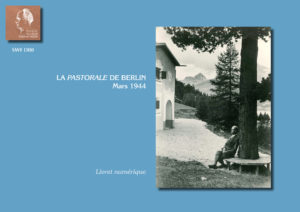Category: Archive
News
Our latest download, SWF D08, is now available: Beethoven’s 6th Symphony, recorded during one of the concerts of the Berlin Philharmonic of 20-21 March 1944 in the hall of the Staatsoper.
This tape, originating from Berlin, has been the object of great care and attention on our part. Over and beyond the tuning, it was above all in connection with the sound that Christophe Hénault (Art et Sons Studio) has been working, the same person who processed the Stockholm concerts (Schubert of 1943, Deutsches Requiem of 1948). The strings, the violins to be frank, were very aggressive and even shrill. On the other hand, the various bass registers seemed to have been taken over by a herd of elephants. The Berliner to be true offered Furtwängler the bass support he required, yet here it became a buzzing sound in which it was impossible to make out the melodic line, when in fact it is a characteristic feature of this symphony that the melodic themes are presented by using all the desks, including those that are often only in counterpoint.
The sound thus presents a highly homogeneous spectrum in which all the instruments find their original colours, within a complex interweaving as designed by the composer. The Pastorale is certainly the most difficult symphony to prepare – with a density rivalling that of the Missa Solemnis: it is almost impossible to bring out everything. This is, however, precisely what Furtwängler achieved, with tempi somewhat more flowing that those in later versions, and notably the ‘official’ Viennese version of 1952. We nonetheless find the customary features of his interpretation: tempos that are more or less easygoing, those of a walk or a stroll (Beethoven was no fan of jogging!), of musings on a riverbank, the simple joy of gazing at traditional peasant festivities, a thunderstorm treated as a great recitative, and a finale that is completely filled with the fragrant, mellow warmth of a starlit evening. An example? A passage in this movement, where, as though intoxicated, we breathe the rhythms of nature…
The digital sleeve notes include the very fine analysis of this performance that Harry Halbreich wrote for the first release as an LP, as well as the list of Furtwängler’s Pastorales and a register of the musicians of the Berlin Philharmonic of that period.
In parallel we publish the detailed comparative study written some thirty years ago by Benoît Lejay. In the absence of the source text, we make available in our Studies a facsimile of the sleeve note accompanying the CD SWF 901.
22 February 1948 was a crucial date in Furtwängler’s life: he gave the first performance of his Second Symphony, in Berlin with his orchestra.
For a man who considered himself a creative artist first and a performer second, and whose first “major” symphonic work this was, there is no doubt that this was one of the most significant concerts.
Here is the facsimile of the programme for the next day, which contains a detailed analysis of the work.
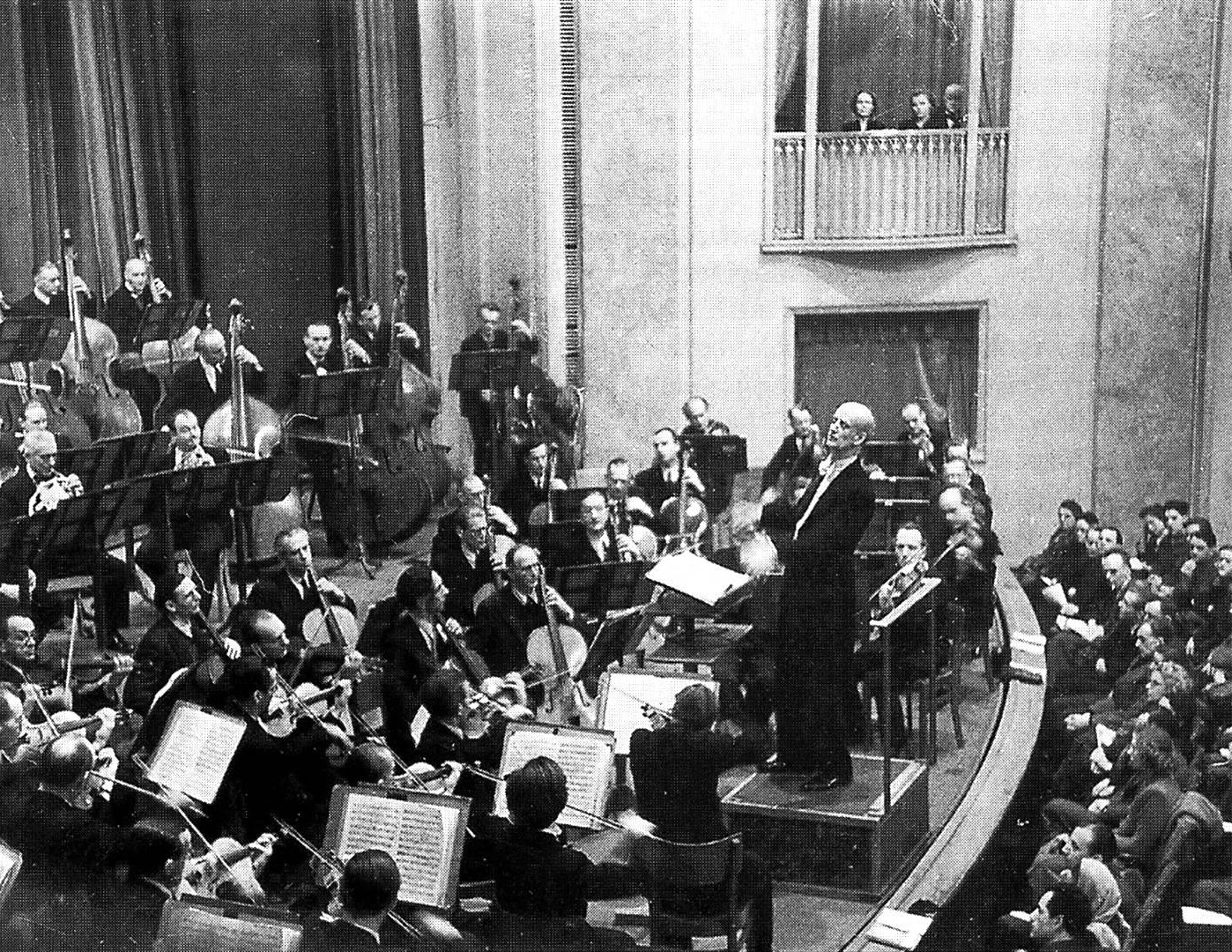
Furtwängler conducting the premiere of his Second Symphony at the Admiralspalast.
It is not often that we conjure up the figure of Furtwängler as a composer. Whatever view we may have of his output and the position it may hold in the history of music, we could not, ‘Furtwänglerians’ that we are, neglect what this represented for him in his own eyes.
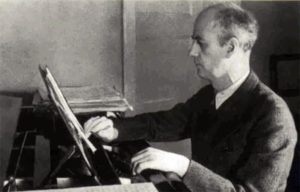
All the more reason for going back to the fine article of 1995 by Bruno d’Heudières, then still a student and active member of the SWF, for the Revue Musicale de Suisse Romande.
And since all that was needed was a click to find it freely available and download it, we are not going to deprive ourselves of the opportunity!
We have already published a photo of Furtwängler in his superb Horch 830 convertible.
Here he is again at the wheel of his car, with an unexpected passenger. Any resemblance with a certain character of Hergé is purely coincidental!
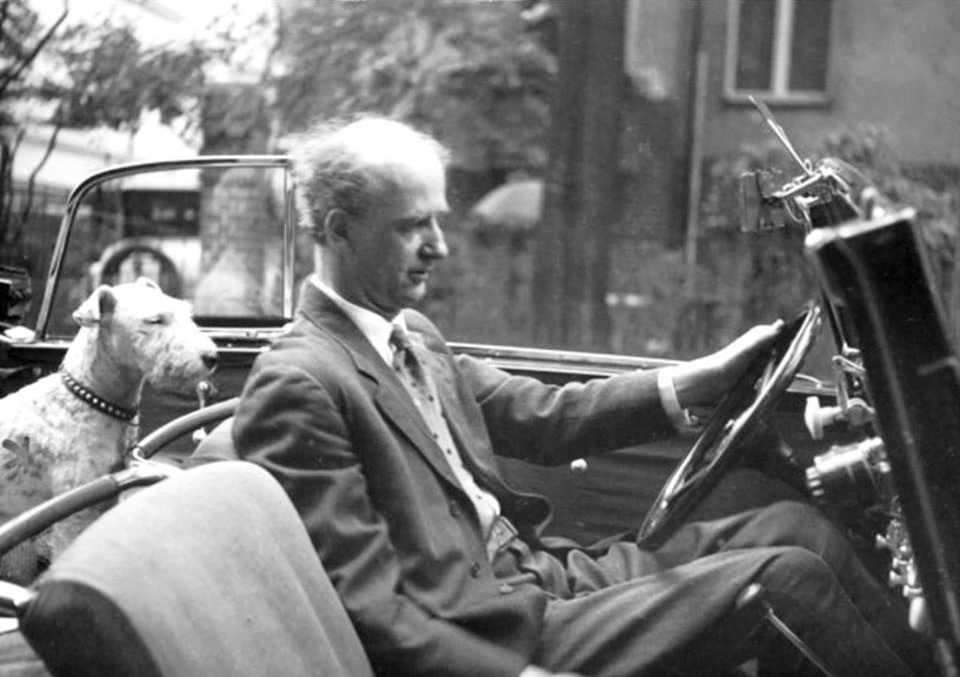
A detail: from some quick research in a 1934 Berlin directory of automobile owners we learn that his 70 CV had the registration number 95495P, and that his wife had a Buick that was older but more powerful…
.
What a truly beautiful Pastorale of Beethoven, recorded at a concert of the Berlin Philharmonic in March 1944 in the hall of the Staatsoper (in between a reconstruction and a second destruction).
Benoît Lejay, in an exhaustive comparative study — that we are republishing — has noted how much more agitated it is, less well behaved, less ‘classical’ than the 1952 Vienna recording commercialised by EMI
We had rereleased it, not very well to be true, on CD. Since then, the Berliner Philharmoniker has released it as part of their voluminous collection of the 1939-1945 recordings. This should have been cause for rejoicing as being a ‘definitive’ recording. And yet we must lower our expectations; the release suffers from two pitfalls: pointless artificial stereo that is also clumsy (through phase shifting), and a failure to set the tape at the proper speed. As a result ‘their’ Pastorale is tuned to A at 448 Hz!
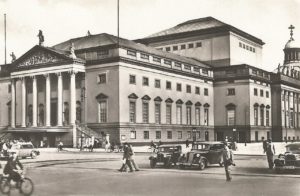
We shall present it in its own ‘juice’, as a mono recording, just as Friedrich Schnapp knew how to do it.
We envisage releasing it as a download (including high definition) for mid May. As always it will be possible, from the version in 16/44, CD format, to engrave a CD for traditional playback.
Lastly, note that the text of the sleeve note — of top quality as always — was written by the late Harry Halbreich.
Furtwängler was on good terms with his colleagues… with perhaps one exception (have a guess…).
Yet there is one conductor with whom his relationship was particularly cordial: Sir Thomas Beecham. A priori, however, everything seemed as though it would keep them apart: heritage, training, repertory, style, the approach to music. Nonetheless, a complicity was established between them, and Sir Thomas was particularly loyal: when Furtwängler was banned by the Nazis from touring in Great Britain, the baton was offered to Beecham, who refused. And when Furtwängler died, on the other hand, he maintained the presence of the late conductor in a concert, the programme of which was not at all typical of the Englishman’s repertory. Faithfulness…
Here is a rare snapshot taken during Beecham’s first invitation to conduct the Berlin Philharmonic, on 29 January 1930. The two conductors stand either side of Sir Horace Rumbold, United Kingdom ambassador to Germany.
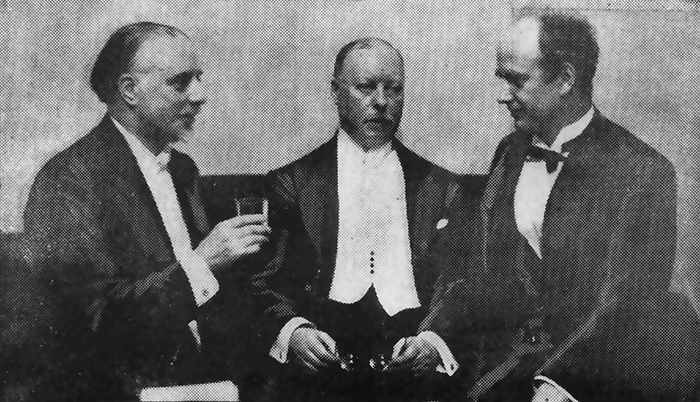
We present facsimiles of concert programmes, and of course Berlin and Vienna often appear among them. Here however is a comparative rarity: a programme of Furtwängler in Paris, at the head of the Orchestre de la Société des Concerts du Conservatoire (OSCC).
Several years previously the orchestra had left the “Salle du Conservatoire”, Bergère Street, and they now performed at the Théâtre des Champs-Elysées (TCE).
Below is the poster announcing the 1948/49 season, including two Furtwängler concerts (omitting the public dress rehearsal), outside the subscription series.
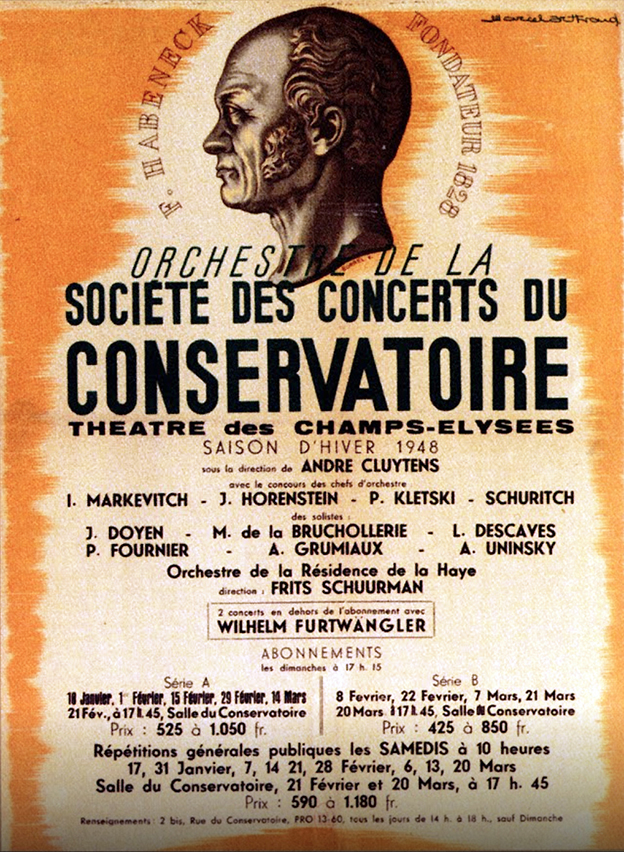
You can find a lot of chocolate in Geneva, a big water fountain and even a few banks… There is also a very fine concert hall, the Victoria Hall. Despite this, see if you can find any record of Wilhelm Furtwängler’s visit to this city and this concert hall…
Here, actually, is one, one you can see: the Berlin Philharmonic Orchestra and its conductor in a snapshot taken during a concert on 8 May 1933.
Members can see this in large format in the iconography.

A promise is a promise.
The recording of the concert of the 50th anniversary of the SWF, on 19 October 2019, is now available to our members. Non-members will have to content themselves with this extract.
Quartets by Schubert, Beethoven and Ravel, performed by the Varian Fry Quartet of Berlin, recorded by Frédéric Briant.
There are two ways to access this:
– streaming (available for the next two months), by clicking here.
– downloading (SWF D07), from the shop, as for another reference, yet of course at no cost (the price is zero euro). 2 formats: CD quality (wav 16/44) and high definition (flac 24/96)
A facsimile of the programme can also be downloaded along with a tutorial to help you downloading.
Those who attended the concert will be able to relive these intense moments; everyone else will discover a concert that will leave an important mark in our history.
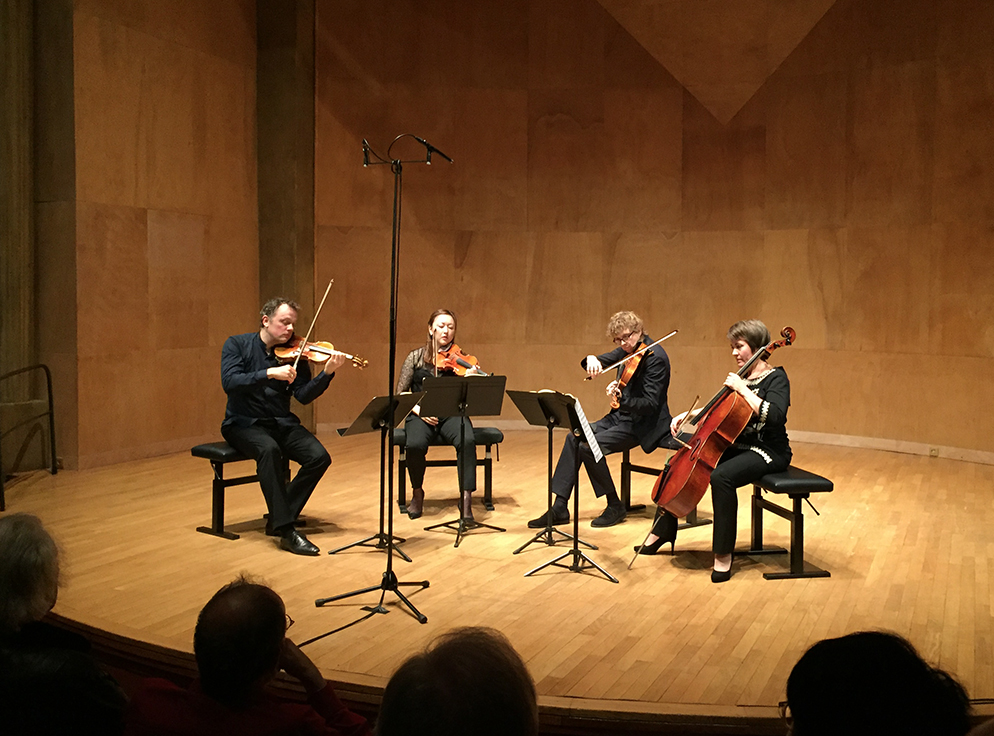
Our friends of the Wilhelm Furtwängler Centre of Japan have just released a double DVD of 2 concerts of Furtwängler conducting the RAI Orchestra of Rome:
– that of 10 January 1952, with the Pastorale and the 5th Symphony,
– that of the 19th of the same month, with the 4th Concerto played by Pietro Scarpini and the Eroica.
When one says ‘DVD’, one often thinks of images. In this case we have just sound files. On your screen you will see menus, like those of a film. By clicking, you will be able to listen in high definition.
With sound that is very reasonable – yet which cannot compensate for the relative dryness of the Foro Italico concert hall – here are some very interesting performances, dominated by that of the Eroica, in which the orchestra seems more at ease, as if this very ‘modern’ music gave the instrumentalists greater inspiration!
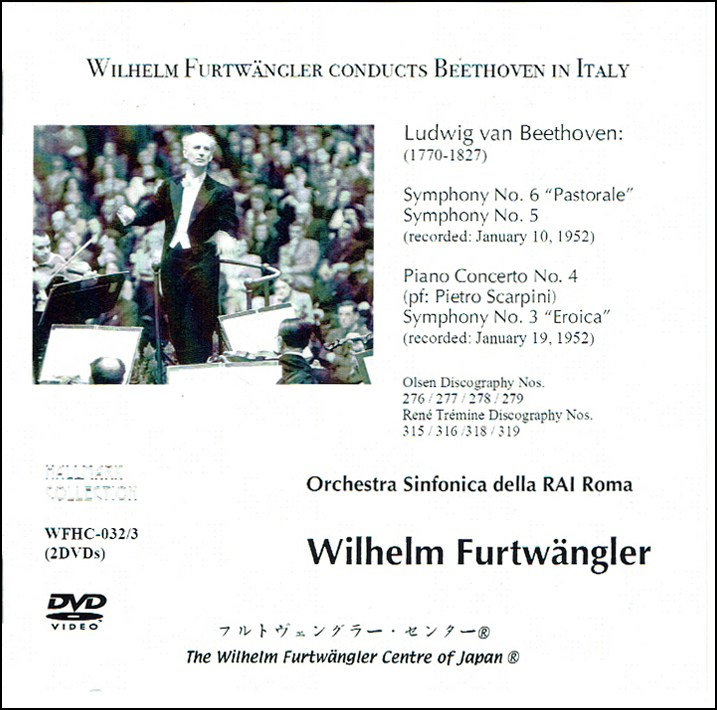
The double DVD is sold on subscription at a price of 35 € – this is the price (+ expenses) determined by the Japanese association.
This subscription is open until 31 May 2020. We shall have the requisite number of DVDs sent over from Japan so that we can then send them on to you.
The order should be placed on our website shop.
.
One of our members, Jean-Luc Tardivat, who is always on the qui vive, noticed this Deutsche Grammophon announcement, copied by the excellent site “Furtwaengler Journal”.
The yellow label is releasing a box-set devoted to the Staatskapelle of Berlin for its 450th anniversary, in other words the Orchestra of the National Opera playing in concert formation. Furtwängler was its conductor before succeeding Nikisch at the BPO.
In order to conjure up Furtwängler’s presence with the Staatskapelle, DG included in its box-set programme the Tristan of October 1947. As is well known, the first act is missing, and our association released a double CD with acts II and III (it can indeed be found on the site mentioned at the head of this article). DG excelled itself by including ONLY act II. Why?
Our double album is still available in our catalogue. Don’t hesitate!

Rehearsal of Tristan in October 1947. On the left: Gottlob Frick (King Marke)
You have not received the CD you ordered from the SWF? This is—if not normal—at least logical.
Everyone will have understood that during this period of confinement, it has not been possible for us to ensure the delivery of your discs or books.
This is an extra reason for thinking of downloading: the coronavirus is not yet attacking internet traffic…
We are grateful for your understanding and urge you to take care!
